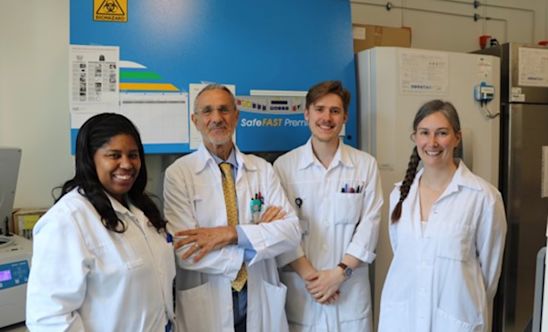Cohort Profile: the gMAD/COSCODE study
12/12/2024

The gMAD-COSCODE study, which features in the EPND Hub, has recruited over 1,000 participants across the Alzheimer's disease continuum, generating data and biosamples to better understand how Alzheimer's disease progresses in different ways in different people - and how the gut microbiota influences cognitive decline. In this Cohort Profile, Giovanni Frisoni, Principal Investigator of gMAD-COSCODE and Professor of Clinical Neurosciences at the University of Geneva, and Dr. Claire Chevalier, Scientific Collaborator at the Hopitaux Universitaires de Geneve, explain the goals, design and findings of the study.
What are the goals of the gMAD-COSCODE study?
The gMAD-COSCODE cohort combines several projects targeting populations within the Alzheimer’s disease (AD) continuum, with a focus on the preclinical and prodromal stages of the disease. One objective is to assess the potential role of the gut microbiota and the gut-brain axis in the pathophysiology of AD. Another aim is to better clinically characterise the subjective cognitive decline (SCD) population. Finally, the cohort is being utilised to identify novel blood-based biomarkers that could serve as less invasive alternatives to lumbar punctures and PET imaging, facilitating early diagnosis.
What disease areas and stages are included, and how many participants are involved?
The gMAD-COSCODE cohort is an observational, prospective clinical study with follow-up approximately every two years for up to 12 years. It is a study focusing on Alzheimer’s disease pathophysiology, encompassing various stages from healthy volunteers to participants with subjective cognitive decline (SCD), mild cognitive impairment (MCI), and dementia. Participants are aged 40–80 years at the time of recruitment. To date, over 1,000 participants have been recruited, with a subset highly characterised using Alzheimer’s disease biomarkers.
What types of data and samples are being collected?
All participants provide demographic information, medical history, and family history details. They also undergo a comprehensive battery of neuropsychological tests to assess various cognitive domains, personality traits, and psychoaffective status. Participants provide biological samples, including blood (plasma, serum, PaxGene, and blood DNA), saliva, and stool, accompanied by data from food frequency questionnaires, cardiometabolic measurements, physical activity tracking, and medication records. Additionally, all participants undergo MRI scans.
A subset of the cohort provides cerebrospinal fluid (CSF) samples, as well as amyloid and tau PET scans, FDG-PET scans, or EEG recordings.
What are some of your recent research findings from the gMAD-COSCODE study?
The gMAD-COSCODE cohort has provided a valuable opportunity to better understand and characterize the previously undefined and at-risk population of SCD patients (Ribaldi et al.). It has also generated supportive data on the potential clinical use of promising blood-based biomarkers such as pTau217 (Mendes et al.). Additionally, new insights into the interaction between the gut microbiota and the gut-brain axis in Alzheimer’s disease pathophysiology are forthcoming.
How can the EPND Catalogue advance neurodegeneration research?
EPND provides an excellent opportunity for facilitated access to cohort information, enabling researchers to quickly identify, from the extensive catalogue, which cohort best suits their research question. It also supports multi-cohort projects that might otherwise be challenging to accomplish without EPND’s resources and scientific connections.
EPND ensures FAIR (Findable, Accessible, Interoperable, and Reusable) access to data sharing, opening both small and large cohorts to a broader community of researchers. This approach will undoubtedly accelerate research on neurodegenerative diseases.
From a cohort perspective, EPND offers high visibility and promotes collaboration, enriching research perspectives and fostering innovative thinking.
Want to learn more? Discover the gMAD-COSCODE listing in the EPND Hub, here.